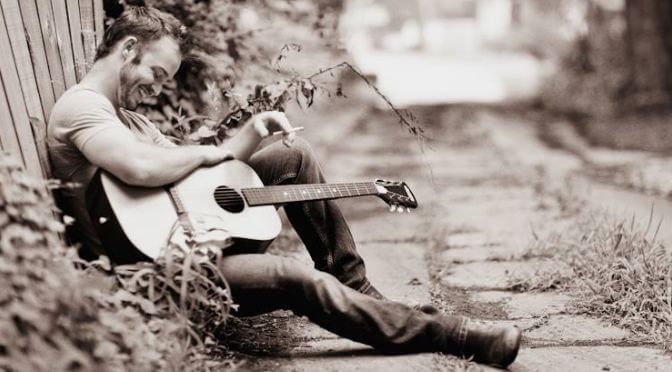It took five sets of stairs to climb to the third floor. Not all apartment buildings are as user friendly as one would hope. Nor every human as intuitive as architects would hope…
I was curious to finally meet the man whose music I had gotten to know pretty well during my daily two hour commute. Matthew Bridgman greeted us with a smile, and our second salutation was the smell of homemade cookies. Within ten minutes, we were pontificating about how the misuse and neglect of language was affecting society. Much like his music, there wasn’t much small talk and filler. Hold the appetizer. Bring on the steak.
![]()
One of the first things you notice about Matthew Bridgman, aka Earnest Matthew, is a vaguely hieroglyphic forearm tattoo. Looking closer, and through the lense of his explanation, you are able to fill in the space between the disjoined curves and project an impressionistic outline of the female form. Matthew explained that she, like most of his tattoos, was built around the aesthetic form of negative space. Much like poetry, the power of her image was that her curves, however sparse, were so familiar, you could recognize her even as just the shadow of her fullness.
He explained how that idea extends into his songwriting. The power of song is in its ability to seduce instead of subdue, and be the frame that begs to be built outward by a mind inspired. The substance against which ideas can take shape.
Here I am as empty as I love to be, again
– Anthem, from The Knowledge of Good and Evil
For Matthew, songwriting is autobiographical, lyrically driven, and meant to elicit emotion. In the liner notes for his debut album, The Knowledge of Good and Evil, he quotes Aldous Huxley, who summarily states the sublime paradox the album takes on. “But I don’t want comfort, I want God, I want poetry. I want real danger. I want freedom. I want goodness. I want sin.”

Throughout, Damien Rice’s haunting influence is apparent in the album’s unreserved poetic treatments of life’s darker sides. What he calls “the alchemy – the rabid, insatiable pursuit – of turning dirt into gold”. Song after song both seeks and achieves the folding of the emotion spectrum into a circinate continuum. A space where “everything is only what it is”. Recognizing the beauty intrinsic to the darkness is the catalyst for both great poetry, and emotive arrangements.
There’re ghosts in all the polaroids our parents took
And they’re weeping for the victims of their crimes
And the cold triumphant prose in all them history books
Is drowning in the blood between the lines
– The Only Thing To Do (unreleased)
In the course of the interview, we nostalgically recounted both having sung “I’m in the Lord’s Army” as children, being raised in what has become known as The “Joshua Generation“, trained to be the front line in the spiritual culture war. We talked about bible school, the carnal side of our perception of justice, Matthew’s time abroad as a perennial missionary in Europe, and how sometimes “missions” was as simple as paddling kids around in a canoe. Much of his music, he said, was both shaped by and in reaction to his experiences being brought up in a variety of religiously fundamentalist environments. For him, though, the light at the end of that tunnel was this understanding;
“Grace is the force that changes realities by way of loving people who haven’t earned it. And frankly earned love feels weird anyway”
On the coffee table of Matthew’s apartment is a bowl of kinetic sand. Discussion (albeit stunted given I haven’t read it) of Dostoyovsky’s The Idiot was interspersed with ebullient chirping from a bird outside we “affectionately” named Fred. We discussed Myers Briggs, Blaise Pascal, and giggled like school girls over song lyrics. Rare are the people who can march into the dark corners of this human experience without being consumed by it. Matthew’s music is a beautifully handcrafted souvenir from that journey.
![]()
You can find Earnest Matthew on Facebook, and download The Knowledge of Good and Evil on iTunes.




Recent Comments